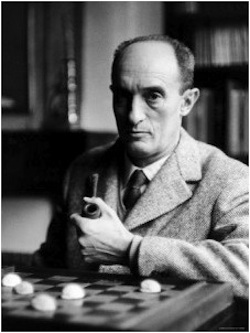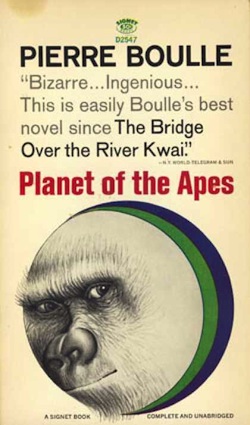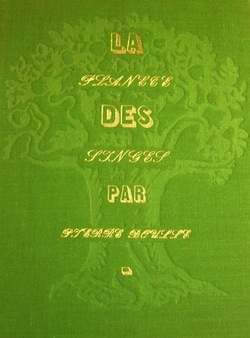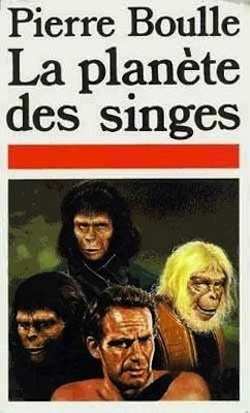Despite being a cult classic of science fiction films, the text upon which Planet of the Apes is based is actually a fairly serious (if not satirical) mainstream novel by French writer Pierre Boulle. Prior to the 1963 publication of La Planète des singes, Boulle was already an author of serious note having written Le Pont de la rivière Kwaï (Bridge over the River Kwai.) That book was of course adapted into the famous David Lean film, which won an Oscar for best-adapted screenplay in 1957. (The award was accepted by Boulle owing to the fact that the screenwriters were blacklisted for being communists. Speaking no English he uttered one word; “merci.”) In any case, Boulle was certainly not considered a science fiction writer, and the original Apes novel seems to have been initially marketed as a political satire. So is the novel science fiction or social allegory? The answer seems to be both.
Xan Fielding did the only English translation of La Planète des singes in 1963. Because the word “singes” has more than one English translation, the book was known as Planet of the Apes in America, but ran under the title Monkey Planet in the U.K. What a different world we might be living in had this version of the translation stuck! Can you imagine being pumped for the new James Franco film Rise of Monkey Planet? Not being a French speaker, I’m not sure how good or bad this translation is, but whatever Xan Fielding did, it comes across as a highly readable novel with super slick prose. At no point do you ever feel like you’re reading an approximation of an idea or a poor translation. Perhaps the only awkwardness that may or may not occur due to translation issues come towards the final third of the book when the narrative randomly switches from a past tense to present tense for entire chapters before reverting back again.
 The story concerns the flight of an Earth ship to the star system of Betelgeuse and eventually the surface of the planet Sonor, a world dominated by intelligent apes. The primary character, a human journalist named Ulysse Mérou is almost instantly captured by intelligent gorillas and thrown into a cage, a place where he resides for the majority novel. Boulle, a former POW himself, seems particularly interested in writing about captivity and the various ways the human psyche copes with it. Though initially enraged and screaming, Ulysse settles down quickly, realizing he has to figure out how to prove to the apes he is intelligent without completely freaking them out. The apes do not speak English nor any other Earth language, but they do have a spoken language in stark contrast to the humans indigenous to Sonor who only bark and grunt like animals.
The story concerns the flight of an Earth ship to the star system of Betelgeuse and eventually the surface of the planet Sonor, a world dominated by intelligent apes. The primary character, a human journalist named Ulysse Mérou is almost instantly captured by intelligent gorillas and thrown into a cage, a place where he resides for the majority novel. Boulle, a former POW himself, seems particularly interested in writing about captivity and the various ways the human psyche copes with it. Though initially enraged and screaming, Ulysse settles down quickly, realizing he has to figure out how to prove to the apes he is intelligent without completely freaking them out. The apes do not speak English nor any other Earth language, but they do have a spoken language in stark contrast to the humans indigenous to Sonor who only bark and grunt like animals.
Eventually, Ulysse manages to get through to Zira, a kind chimpanzee scientist who with the help of her fiancée Cornelius hatches a plan for Ulysee to prove to the governing body that he is indeed an intelligent man. The world of this novel is far from being merely symbolic. It is a fully realized fictional creation, a true speculation as to what such an evolutionary reversal would be like logistically. My favorite aspect of this, and probably something no onscreen adaptation could never capture, was the description of all the various apes wearing gloves on their feet in place of shoes. Also on the subject of monkey feet; one of the more moving scenes in the novel occurs just after Ulysse has delivered his rousing speech and the chimps, gorillas, and orangutans are all applauding him:
I would never have thought it possible for an assembly in the world to break into such commotion. I was deafened by it, retaining just enough composure to observe one of the reasons for this fantastic din: apes, who are exuberant by nature, clap with all four hands when they are pleased. I was thus surrounded by a seething mass of frantic creatures balancing on their rumps and waving their four limbs in a frenzy of applause punctuated by wild yells in which the gorillas’ deep voiced predominated.
 Unlike the famous film adaptations, the ape culture of Sonor is highly advanced. At one point, after winning his freedom, Ulysse is flying on an airplane piloted by apes. Though it is asserted that the Earth culture from which Ulysse comes is more advanced than the apes of Sonor, they are by no means riding around on horses and living in huts. This is actually one of the things that makes the novel work so well. It does truly feel like he’s come to an entire planet ruled by apes, one that has commerce, a government, a caste system and so forth. Boulle may have been writing a political farce in the spirit of Animal Farm or Gulliver’s Travels, but the ways in which he fleshes out the social and logistical workings of this world are meticulously detailed.
Unlike the famous film adaptations, the ape culture of Sonor is highly advanced. At one point, after winning his freedom, Ulysse is flying on an airplane piloted by apes. Though it is asserted that the Earth culture from which Ulysse comes is more advanced than the apes of Sonor, they are by no means riding around on horses and living in huts. This is actually one of the things that makes the novel work so well. It does truly feel like he’s come to an entire planet ruled by apes, one that has commerce, a government, a caste system and so forth. Boulle may have been writing a political farce in the spirit of Animal Farm or Gulliver’s Travels, but the ways in which he fleshes out the social and logistical workings of this world are meticulously detailed.
But naturally, it’s not all-fanciful science fiction. Boulle makes some pretty strong points about the very nature of humanity; though not near as heavy-handedly as perhaps the first two films. The most striking of these revelations occurs when Ulysse is reunited with his lost comrade, Professor Antelle, the scientist responsible for the technology which powered the human spaceship. The apes have put Antelle in the zoo, but when Ulyssee recognizes him he is quickly faced with the reality that Antelle has become like all the other humans of Sonor. Antelle behaves like an animal. It seems Boulle is making commentary on human identity and how frail our notions of self could become in extreme circumstances, like captivity.
Ulysse was able to keep it together whereas Antelle, theoretically the superior intellect couldn’t. For me, Boulle is making a fairly strong statement about individuality being truly intrinsic, rather than something created in response to a social construct. Ulysse had nothing of his own culture to ground him in any sort of sane assessment of himself. And yet he endured while Antelle went bonkers and assimilated with the culture of the wild humans. Make no mistake, Bouelle is not saying Antelle was playing along with the wild humans in order to save himself, instead Bouelle is saying the brilliant Professor Antelle was always one of the wild humans. Whereas, Ulysse, for whatever reason, wasn’t. Our inate differences do define us, and apparently, some of us are monkeys deep down.
If the novel is truly about what the next evolutionary step for humankind could be, Bouelle seems to think it should probably be one in which we push our minds to the limits in terms of context. When dropped into a monkey planet would anyone retain their “humanity”? Bouelle seems to think that if you couldn’t, it probably doesn’t deserve to be a cherished thing to begin with. The meta reading I take from this is Ulysse is the author; creative, open-minded and forward thinking, and yet also humble. Whereas Antelle is the kind of intellect or famous person who takes credit for things, but isn’t at the core of their soul anything special. Having Ulysse be a journalist is particularly instructive here, because it grants the narrator a degree of objectivity that we buy almost immediately. Ulysse can’t take himself out of the story, but still tries to tell us his story of the planet of the apes like an embedded journalist.
 The only flaw I find with the novel is its relatively hokey framing mechanism. If you haven’t read it, this is a spoiler, though I doubt much of a big one. The story of Ulysse and his journey to Sonor is framed as a message in a bottle discovered by two future space vacationers. At the end of the novel, it is revealed these two are intelligent chimps. The reason why this reveal isn’t interesting is two fold. For one thing, its not about Ulysse, so that’s a drag. Second, the narrative of Ulysse and his return to Earth already ends with one twist; he returns to Earth of the future and finds it populated by apes. Having a second twist involving apes is just overkill. Ultimately though, having Sonor decidedly NOT be Earth (as in the film) is very satisfying. The reader is left to draw their own conclusions as to how the future Earth became populated by intelligent apes. Ultimately the logistics of it aren’t too important, because this final scene in Ulysse’s narrative is so effectively chilling:
The only flaw I find with the novel is its relatively hokey framing mechanism. If you haven’t read it, this is a spoiler, though I doubt much of a big one. The story of Ulysse and his journey to Sonor is framed as a message in a bottle discovered by two future space vacationers. At the end of the novel, it is revealed these two are intelligent chimps. The reason why this reveal isn’t interesting is two fold. For one thing, its not about Ulysse, so that’s a drag. Second, the narrative of Ulysse and his return to Earth already ends with one twist; he returns to Earth of the future and finds it populated by apes. Having a second twist involving apes is just overkill. Ultimately though, having Sonor decidedly NOT be Earth (as in the film) is very satisfying. The reader is left to draw their own conclusions as to how the future Earth became populated by intelligent apes. Ultimately the logistics of it aren’t too important, because this final scene in Ulysse’s narrative is so effectively chilling:
The driver gets out of the vehicle. He has his back turned to me. He is half concealed by the long grass growing in the space between us. He opens the door for the passenger to alight. I was not mistaken, he is an officer; a senior officer, as I now see from his badges of rank. He jumps down. He takes a few steps toward us, emerges from the grass, and at last appears in full view. Nova utters a scream, snatches my son from me, and rushes back with him to the launch, while I remain rooted to the spot, unable to move a muscle or utter a sound. He is a gorilla.
Sure, it’s not as grandiose as finding the Statue of Liberty being discovered in the sand, but it’s damn good writing. I don’t feel too bad about revealing this “twist ending” because you see all of this stuff coming a mile away. There are some other plot developments throughout however; that I have to say, did surprise me. I wouldn’t describe Planet of the Apes as a page-turner, but if you get into it, I think you’ll find that you won’t want to put it down. It’s a frightening book making plenty of commentary on what kind of animals human beings really are.
Ryan Britt is a staff writer for Tor.com.











Well, really it’s Rod Serling who turned it into one of the best Twilight Zone stories ever.
I’ve read bits and pieces of the original, in French. It’s the most sexist thing I’ve ever thrown across the room. AVOID.
I tend to think that Boulle is viewing identity in a social context, since if identity were innate, then it should have something of a biological basis, which is undercut by Ulysse having a son with Nova, an indigene human. The indigenous humans are the same critters as the Terrans, a fact which does not help Ulysse’s standing among the simians, either.
The frame story of the couple on the luxury space yacht could be a bit of overkill, but I think that it helps eliminate the flickering hope that Ulysse and family could be “out there, somewhere” leading a human renaissance. The pair of endings that Boulle presents, while not as iconic as Mr. Heston’s “You blew it up! God damn you all to Hell!”, are both stuck in my memory – the senior officer (“He is a gorilla.”) and Phyllis on the space yacht, “powdering her muzzle” while dismissing the message in the bottle as too fanciful.
@eugene R. Fair points! I suppose it would sort of defeat the purpose of the novel to think Ulysse was leading a rebellion. Or maybe the Gorilla turned out to be nice! The fact that Phyllis and Jin haven’t heard of any humans really makes the book hopeless. Yep. You’re right.
@TexAnne
You know, I’d be curious to see if some of that comes across more in the French than in English. I’m not sure I saw it in the translation.
It’s been quite some time since I’ve read it, but I don’t recall it being nearly as much about religion as the movie was. And yes, the “reveal” at the end is pretty silly.
Ryan, 5: It wouldn’t be unheard of–Verne’s first American translator put in scads of racism that wasn’t really there (in addition to the inescapable “I’m a 19th-century European” crud). I’m not about to do a side-by-side reading, however.
@@@@@ 7Tex Anne
Fair enough! But it’s an interesing point. Some day, when I learn French, I’ll see what I can do. :-)
I blamed the fact I didn’t like it on the translator, so it’s interesting to hear that someone hated it in french too. One of the few movies I can think of that was better than the book. (The Sound of Music being the other)
It gets really depressing. Apes are not monkeys, nor are monkeys apes, anymore than either are lemurs, bushbabies or lorises. All are primates, though not necessarily the Primates who sit in Synods.
So, first of all, get the science right, then you won’t have to write Atlanta Nights Revisited just to set the record straight.
That said, I’m delighted that the sixties film that really impressed me when I saw it in the eighties, is an English adaption of a French satire. Gives me an extra reason to dig up my French … though judging from your comments, the film is rather more economical than the book in making its final point.
@10 The Grey Drape
Regardless of translation issues, it appears Boulle got the science right insofar as the “apes” actually in the book are all chimps, gorillas or orangutans (just like the movies) After looking it up in a few different places just now, it appears those guys are all “great apes.” The Monkey Planet business was obviously a less than perfect translation.
I also liked the double ending which I read as suggesting that humanity will inevitably ‘de-evolve’ and be replaced with the apes. Antelle is the standard, Ulysse the exception, perhaps unique.
IMO, the book was depressing but the movies were dumb. [Your Mileage May Vary.]
@a-j
I like the idea that Antelle is the standard. That’s a fun way to look at it.
Hm, sexism in “The Planet of Apes”? True, Nova is shown as stupid and beautiful (or maybe the other way around, according to Ulysse), but the same can be said about Antelle and all “jungle-humans” on Sonor. I don’t remember any diminuitive remarks about Zira – but I read a translation (in Polish), not “the real thing”, so maybe it depends (however I don’t think it very probable that both English and Polish translations censored sexist remarks from French original).
I loved these “genetic memory” parts, in which jungle-humans had started talking and describing situation from hundreds (or maybe thousands? I forgot) years ago, the growing threat of self-conscious apes and their revolt, marching drums and all that… I think “The Rise of the Planet of the Apes” may take some motives from the original French novel, as it is exactly this period – growing threat and revolt – that is shown in the new “Apes” movie.
It’s great to see such a well written article and intelligent discussion around a work that I feel is both very good science fiction and biting social satire. One minor thing that I would point out is that Betelgeuse’s third satellite, where Ulysse and his shipmates land, was dubbed by them as “Soror”, not Sonor. This was due to the similarities that this planet shared with Earth/Terra.
Another matter that I’d like to address is the controversy regarding sexism in the novel. Nova is presented as beautiful and unintelligent, but eventually learns to speak. There is also the matter of another prominent female character in the novel who is intelligent, forward-thinking and principled. Zira not only readily accepts that Ulysse is intelligent, once they trade notes on geometry, but risks her career and standing in simian society to help him not once, but twice. If Nova can be seen as a negative female stereotype, than Zira is unquestionably a positive depiction of the female sex.
I liked this book a lot, and unlike Mr. Britt, I also liked the framing device, including the second twist ending.
I liked this book a lot, and unlike Mr. Britt, I also liked the framing device, including the second twist ending.
I noticed in the novel, that apekind in general had no particular animosity towards humans. Humans were simply viewed as wild animals like cougars and bears- allowed to roam free in the wild (unless it is hunting season), but not allowed to roam freely in settled communities. also, when Ulysse was discovered to have speech, ape society treated him as a person. He is only viewed as a threat when he knocks up Nova. A talking human as a visitor from another world was fine; a race of talking humans living among apes was not.
Escape from the Planet of the Apes was a much more faithful adaptation to the novel than Planet of the Apes.